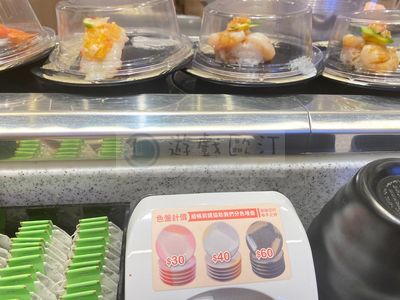台灣最大的迴轉壽司連鎖餐廳:真鮮壽司(Sushi Express)
真鮮壽司(Sushi Express)是台灣知名的迴轉壽司連鎖餐廳,成立於1996年,是台灣首批引入迴轉壽司概念的餐廳之一。專攻平價、親民的市場,讓顧客能以實惠的價格享用各種壽司。每盤壽司通常以固定價格出售,為台幣30元、40元跟60元,這種定價策略吸引大量消費者,特別是學生、上班族及家庭客群。分店遍佈全台,不僅在各大城市的商圈有多家店鋪,在亞洲其他國家如中國大陸、香港、新加坡和泰國等地也擁有多處分店,目前已經跨國經營的企業。
創始人陳津秋早期從事紡織業,早年在日本旅行的時候發現迴轉壽司的商機後回台創業。全盛時期每月展店一家,設備與台灣廠商訂製。不需要聘請高薪的壽司師傅,只需要用機器壓米飯,並將魚料貼上即可。每年營收超過百億,目前團隊由創始人的女兒們負責,除賣壽司外還有進口海產及擴展其他副品牌。
以其豐富的菜單著稱,提供多種壽司選擇,從經典的生魚片壽司到各式熟食壽司、創意料理都有涵蓋。此外,還供應一些日式小菜、甜點和飲品,滿足各種口味的需求。這些菜品被放在迴轉帶上,顧客可以自行挑選,這種模式不僅方便快捷,也增加用餐的趣味性。
真鮮壽司的優點在於其平實的價格和便利性。由於價格親民,顧客可以以相對低廉的成本享用各種新鮮壽司,這是吸引大量學生及上班族的原因之一。再者,由於真鮮壽司的分店遍布各地,讓顧客能輕鬆找到並享用壽司,便利性極高。而迴轉壽司的模式使得顧客不必等候點餐,直接取用喜歡的壽司,服務快速且高效,適合現代生活的快節奏需求。真鮮壽司還強調食材的新鮮度,雖然價格親民,但他們在保持一定品質方面仍有不錯的口碑。
然而,真鮮壽司也有一些缺點。由於主打平價路線,有些顧客認為壽司的質量與高端壽司店相比略有差距。特別是在魚肉的厚度和新鮮度上,與更高價位的壽司店有所不同。此外,由於真鮮壽司的受歡迎程度高,特別是午餐或晚餐高峰時段,經常需要排隊等位,這可能使部分顧客感到不便。再者,迴轉壽司的模式雖然方便,但如果某些壽司在轉盤上放置時間過長,可能會影響其口感,特別是壽司飯變得乾硬,這對於口感要求較高的顧客來說可能是一個問題。最後,儘管提供的壽司種類多樣,但相較於一些高端壽司餐廳,他們的菜單相對固定,創新和變化較少,因此對於喜愛新奇體驗的顧客來說可能顯得單調。
總體而言,真鮮壽司在台灣的迴轉壽司市場上佔有重要地位,憑藉其價格優勢和便捷的用餐方式,吸引大量顧客。然而,質量和創新性相較於更高端的壽司店仍有提升空間。
Sushi Express is a well-known conveyor belt sushi chain restaurant in Taiwan, established in 1996. It was one of the first restaurants in Taiwan to introduce the concept of conveyor belt sushi. Targeting an affordable and accessible market, Sushi Express allows customers to enjoy various types of sushi at reasonable prices. Each plate is usually sold at a fixed price, most commonly NT$30, a pricing strategy that attracts a large number of consumers, particularly students, office workers, and families. With branches spread throughout Taiwan, not only in major city business districts but also across other Asian countries such as mainland China, Hong Kong, Singapore, and Thailand, it has grown into an international enterprise.
Founder Chen Jin-Chiu, who initially worked in the textile industry, noticed the potential of conveyor belt sushi during his travels in Japan and decided to start his own business in Taiwan. At its peak, Sushi Express was opening one store per month, with equipment manufactured by local Taiwanese companies. There was no need to hire highly paid sushi chefs, as machines could press the rice, and fish toppings could simply be added. With annual revenues exceeding billions, the business is now run by the founder’s daughters. In addition to selling sushi, the company also imports seafood and has expanded into other sub-brands.
Sushi Express is known for its diverse menu, offering a wide selection of sushi, from classic sashimi sushi to a variety of cooked sushi and creative dishes. It also serves Japanese side dishes, desserts, and beverages, catering to a range of tastes. These dishes are placed on a conveyor belt for customers to select from, providing a convenient and fast-paced dining experience while adding an element of fun.
The strengths of Sushi Express lie in its affordable pricing and convenience. Due to its low prices, customers can enjoy fresh sushi at relatively low costs, which is one of the main reasons it attracts a large number of students and office workers. Additionally, with branches located across Taiwan, customers can easily find and enjoy sushi wherever they are, making the brand highly convenient. The conveyor belt system allows customers to quickly grab their preferred sushi without waiting to order, providing fast and efficient service that suits the fast pace of modern life. Sushi Express also emphasizes the freshness of its ingredients, and despite its budget-friendly pricing, it maintains a solid reputation for consistent quality.
However, Sushi Express does have some drawbacks. Since it focuses on a budget-friendly approach, some customers feel that the quality of the sushi falls short compared to higher-end sushi restaurants. Specifically, the thickness and freshness of the fish may not match that of more expensive establishments. Furthermore, due to its popularity, especially during lunch and dinner peak hours, customers often have to wait in line, which can be inconvenient for some. The conveyor belt system, while convenient, can also affect the quality of the sushi if items are left on the belt for too long, potentially leading to dry or hard sushi rice, which may not satisfy customers with higher standards for texture. Lastly, although the menu is diverse, it is relatively fixed compared to high-end sushi restaurants, offering less innovation and variation, which may feel monotonous to customers seeking new dining experiences.
Overall, Sushi Express holds an important position in Taiwan's conveyor belt sushi market, attracting a large number of customers with its price advantage and convenient dining style. However, compared to more upscale sushi establishments, there is still room for improvement in terms of quality and innovation.


- 1
- 2
- 3
- 4
